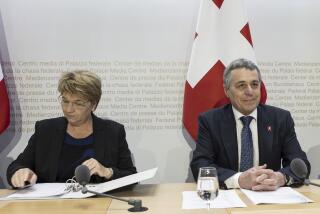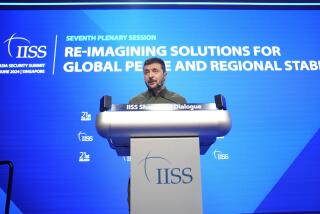Frustration, not progress, behind date for Syria peace talks
Syrian President Bashar Assad and backers of the rebel forces fighting to oust him on Monday disputed weekend reports of an agreement to convene peace talks in Geneva next month to negotiate an end to the protracted civil war.
It remained unclear whether the Sunday announcement by Arab League Secretary-General Nabil Elaraby was premature or an effort by frustrated international mediators to push the deadlocked combatants into negotiations. But the reactions to the peace conference reportedly set for Nov. 23-24 have been anything but encouraging.
Assad, who had previously agreed to attend a peace conference as long as he wasnât expected to negotiate with âterroristsâ -- his term for the rebels -- on Monday denied that the circumstances needed for peace talks exist.
âThere is no date so far [for the conference] ... and current factors do not help in holding it,â Assad told Lebanonâs Mayadeen television in an interview, referring to the unrelenting gun battles that have left much of Syria in rubble and chaos. âMany questions about this conference are still on the table.â
Assad also indicated his participation would depend on what figures or groups would represent the armed opposition and whether they had âcredibilityâ in speaking for the Syrian people.
Rebel groups fighting Assadâs government have long said they wonât negotiate until the embattled president steps down to allow a government of national reconciliation to take over and rule Syria. And those elements of armed opposition supported by the United States and other Western countries are now fighting a two-front war, against Assadâs forces as well as militant jihadists pursuing a future Syria governed by sharia, or Islamic law.
Elaraby met with Lakhdar Brahimi, the United Nations special envoy on Syria, on Sunday and told journalists in Cairo that the Geneva meeting was set for Nov. 23-24. He noted there remained âmany arrangements and many obstacles and difficulties that have to be overcome,â but suggested those details would be worked out.
Brahimi, at the same news conference, said no specific date had been set but that one would be announced soon, after a round of diplomacy to consult with officials in Qatar, Turkey, Iran, Syria, Russia, the United States and the U.N. Security Council.
U.S. Secretary of State John F. Kerry cast the conference in doubt when he made brief remarks to reporters in Paris after meeting Monday with Qatari Foreign Minister Khalid Attiyah. Qatar and other Persian Gulf Arab states have been supporting the predominantly Sunni Muslim rebels fighting Assadâs government forces, led by followers of his Shiite-aligned Alawite sect.
Asked about Iranâs role at the meeting dubbed Geneva II, following a fruitless peace conference in the Swiss city last year, Kerry said he thought it was âvery hard to see how Iran can be constructiveâ given its rejection of the international communityâs positions during earlier talks aimed at ending the civil war now in its third year.
Iran, like Russia and China, has refused to back demands by Western countries and Syriaâs Sunni-ruled Middle Eastern neighbors to make any peace agreement contingent on Assad stepping down.
Kerry was headed for London, where 11 countries that make up the Friends of Syria alliance planned to huddle Tuesday and discuss the prospects for a Geneva meeting next month. A senior State Department official in his delegation who briefed reporters in a background media call from Paris disclosed that the strategy of the Geneva gathering was to give the combatants an alternative to an endless âwar of attrition.â
âThe regime has advanced in some of the southern neighborhoods [of Damascus] but this is almost World War I-style advances, where theyâre moving a couple hundred meters,â said the official. âBut at the same time, the armed opposition has made advances in the south around Dara and along the border. So itâs just kind of a seesaw that goes back and forth.â
The official said the aim of the London meeting of Syrian opposition backers was to give the coalition of rebel groups âthe sense that Geneva II is an alternative to grinding out the war of attrition on the ground.â
About $100 million in U.S. aid to the rebel coalition is about to be released, the official said, suggesting that the money for administration of areas under rebel control would serve as an inducement for them to come to Geneva.
No official response to the peace conference announcement was made or expected from the rebels, the official said, noting that the main groups would decide after consultations among themselves at the end of October.
ALSO:
Passenger train bombed in Pakistan, at least seven dead
Russian investigators delve into bus bombing in Volgograd
Global search underway for parents of girl found with Greek Roma
A foreign correspondent for 25 years, Carol J. Williams traveled to and reported from more than 80 countries in Europe, Asia, the Middle East and Latin America.
More to Read
Sign up for Essential California
The most important California stories and recommendations in your inbox every morning.
You may occasionally receive promotional content from the Los Angeles Times.











